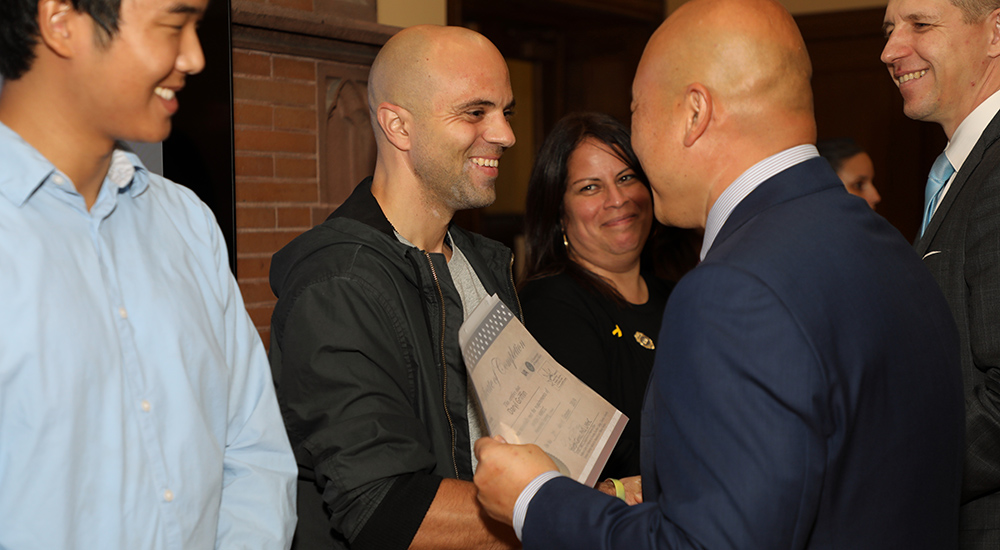Military life can be full of transitions. From deployments to retirement, these times can bring about both new opportunities and challenges. Active duty service members have long enjoyed the support of sponsors during their military service transitions. But similar support is not provided for the final transition to civilian life.
VA’s Expiration Term of Service (ETS) Sponsorship Program is beginning to change that, with promising results.
The program helps transitioning service members secure housing, find jobs, pursue educational opportunities and access mental health support, while also providing support to their families.
When service members execute an ETS or retire from service, there is no individual assigned responsibility for their transition into the civilian world. This transition can be challenging, as service members lose the benefits of military leadership, camaraderie, support and structure.
These losses can lead to increased stressors, a decreased sense of purpose and an elevated risk for suicide and other mental health concerns when service members rejoin the civilian community.
As a result, VA has started collaborating closely with the U.S. Department of Defense; academia, including Syracuse and Columbia universities; local governments; and nonprofits, such as American Corporate Partners and ProVetus, to launch the ETS Sponsorship Program.
The ETS Sponsorship Program is available in New York City and San Antonio. Program leadership plans additional launches in Boston; Charlotte, North Carolina; Dallas; Pittsburgh; Seattle; and Washington, D.C.
In the photo above, ETS sponsors attend a graduation ceremony in New York City.
How does ETS sponsorship work?
After signing up at their military installation, the program matches service members with an ETS sponsor. Sponsors at the service member’s identified post-military hometown are selected based on the service member’s job interests, gender and other characteristics, interests and needs.
Sponsorship sessions occur virtually until the service member arrives home. Thereafter, thanks to the support of Starbucks, in-person sessions can continue in local Starbucks coffee shops or at other locations in the service member’s community. When the meeting is at Starbucks, the restaurant offers complimentary beverages and food.
VA provides certification training for ETS sponsors, enabling them to assist service members with the following:
- Transitioning tasks, such as education, employment, housing, legal support and medical/mental health support.
- Overcoming the stigma that they may associate with seeking mental health support when they need it.
- Connecting to VA and community resources in partnership with AmericaServes, Combined Arms and other similar networks in select cities.
- Responding to any signs of possible suicide risk.
How can I get involved?
If you are serving in the military and plan to move to Boston, Charlotte, Dallas, New York City, Pittsburgh, Houston, Austin, San Antonio, Seattle or Washington after your military service, you can register to be assigned an ETS sponsor (depending on the progress of the program’s expansion). Identify your interest in participating in the ETS Sponsorship Program and indicate the city where you plan to live after your service.
Likewise, if you live in one of the ETS sponsorship program cities and would like to take on the responsibility of becoming an ETS sponsor and helping service members successfully transition, complete an application here.
To access mental health information and resources for transitioning service members, visit the Transitioning Service Member overview page.
To hear Veterans’ stories about transitioning from military service, visit the Transitioning From Service page on the Make the Connection website.
Joseph Geraci, Ph.D., LMHC, is a psychologist, a New York state-licensed mental health counselor and a retired U.S. Army (infantry) lieutenant colonel. Geraci works in VA VISN 2’s MIRECC Center of Excellence in the Bronx, New York.
Marianne Goodman, M.D., is a psychiatrist and associate director of VA VISN 2’s MIRECC Center of Excellence. She is a professor and the director of the Suicide Prevention Clinical and Research Program.
Richard Seim, Ph.D., is the acting director and education and dissemination core leader of the VA VISN 17 Center of Excellence for Research on Returning War Veterans in Waco, Texas.
Topics in this story
More Stories
Veteran Byron Potier weighed almost 300 pounds and was tired and lethargic. He was the perfect candidate for gastric sleeve surgery.
How much do you know about VA care, benefits and services? Don’t miss out on what you've earned—check out the "2025 VA Federal Benefits Guide for Veterans, Dependents, Survivors, and Caregivers" handbook to learn more.
Feeling stressed? Your breath can help you relax and focus. Take 3 minutes to reset and prioritize your well being for this week's #LiveWholeHealth practice.






